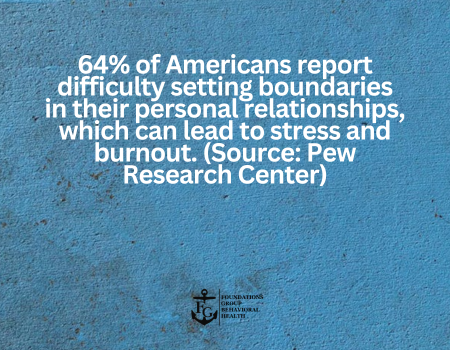Maintaining healthy relationships is a cornerstone of emotional well-being. However, balancing meaningful connections with the need for self-care can be challenging, especially when managing mental health conditions or navigating a busy lifestyle. Striking the right balance between nurturing relationships and prioritizing your well-being is essential for long-term emotional stability and growth.
At Foundations Group Behavioral Health, we understand the vital interplay between self-care and relationships. Our programs, including Psychiatric Day Treatment, Half-Day Treatment Programs, and Outpatient Mental Health Programs, empower individuals to build strong connections while maintaining their mental health.
The Importance of Self-Care in Relationships
Self-care and relationships are interconnected. When you prioritize your mental and physical health, you’re better equipped to engage fully with others. Likewise, strong, supportive relationships can bolster your resilience and provide a sense of belonging.
Benefits of Integrating Self-Care into Relationships
- Enhanced Emotional Stability: Regular self-care practices reduce stress and increase your capacity for empathy and patience.
- Improved Communication: When you feel balanced, you’re better able to express yourself clearly and listen actively.
- Mutual Growth: Modeling self-care encourages loved ones to prioritize their own well-being, strengthening the relationship.
8 Ways to Connect with Important Relationships While Practicing Self-Care
1. Set and Maintain Healthy Boundaries
Boundaries are the foundation of healthy relationships. They allow you to prioritize your well-being while fostering respect and understanding.
- How to Practice:
- Communicate your limits clearly and assertively, such as letting others know when you need personal time.
- Recognize when you feel overwhelmed and give yourself permission to say no.
- Ensure boundaries are consistent to avoid misunderstandings.
- Example: Let friends and family know that while you value their company, you may need some evenings to recharge alone.
2. Engage in Quality Time Together
Spending intentional, distraction-free time with loved ones can deepen bonds and create positive memories.
- How to Practice:
- Plan activities that you both enjoy, such as cooking, hiking, or watching a favorite movie.
- Be fully present by setting aside devices and focusing on the moment.
- Use shared time to express gratitude and appreciation for each other.
- Example: Schedule a weekly dinner with a close friend where you both disconnect from phones and enjoy meaningful conversation.
3. Practice Mindful Communication
Mindful communication fosters deeper connections by ensuring that both parties feel heard and understood.
- How to Practice:
- Listen actively, giving the other person your full attention.
- Reflect back what you hear to confirm understanding and show empathy.
- Avoid interrupting or formulating responses while the other person is speaking.
- Example: During a difficult conversation, focus on the speaker’s emotions and validate their feelings without jumping to offer solutions.
4. Combine Self-Care with Relationship Building
Certain self-care activities can be shared, allowing you to nurture your relationships while prioritizing your health.
- How to Practice:
- Exercise together, such as going for a walk or taking a fitness class.
- Explore mindfulness practices like meditation or yoga as a pair.
- Attend workshops or events that align with your mutual interests.
- Example: Suggest a morning walk with your partner, combining physical activity with quality time.
5. Celebrate Achievements and Milestones Together
Recognizing accomplishments, both big and small, strengthens relationships and reinforces positivity.
- How to Practice:
- Celebrate personal and shared goals, such as completing a project or overcoming a challenge.
- Create traditions for marking milestones, like a monthly gratitude dinner.
- Share your progress in self-care or mental health goals and invite loved ones to celebrate with you.
- Example: Host a small gathering to acknowledge a loved one’s achievement or share how their support has helped you meet a personal goal.
6. Create Space for Individuality
Healthy relationships thrive when both individuals have the freedom to pursue their interests and personal growth.
- How to Practice:
- Respect each other’s need for personal time and space.
- Encourage loved ones to explore hobbies and passions.
- Use solo time to reflect on your needs and self-care practices.
- Example: While your partner takes a painting class, spend the evening journaling or enjoying a hobby you love.
7. Seek Professional Support Together
Therapy or counseling can help improve communication and understanding within relationships, especially if mental health challenges are a factor.
- How to Practice:
- Attend couples or family therapy to address relationship dynamics.
- Explore individual therapy to strengthen your personal foundation.
- Join a support group to connect with others experiencing similar challenges.
- Example: Participate in a Family Therapy Program through an Outpatient Mental Health Program to learn new ways to support each other.
8. Develop Rituals for Connection
Rituals create consistency and stability in relationships, offering opportunities to reconnect regularly.
- How to Practice:
- Establish daily check-ins, such as sharing highlights of your day.
- Create weekly or monthly traditions, like movie nights or weekend brunch.
- Use rituals to incorporate self-care, such as meditating together each morning.
- Example: Plan a Sunday evening ritual where you and a loved one reflect on the past week and set intentions for the next.

How Mental Health Programs Support Self-Care and Relationships
For individuals managing mental health conditions, maintaining self-care and fostering relationships can feel overwhelming. Professional programs can provide the tools and strategies needed to balance these priorities effectively.
Programs Offered at Foundations Group Behavioral Health
- Psychiatric Day Treatment
- What It Offers: Intensive, structured care for individuals with significant mental health challenges.
- How It Helps: Includes skill-building for emotional regulation, communication, and self-care integration.
- Half-Day Treatment Programs
- What It Offers: Flexible care designed for those balancing treatment with work or family responsibilities.
- How It Helps: Focuses on creating routines that prioritize self-care while fostering healthy connections.
- Outpatient Mental Health Programs
- What It Offers: Ongoing therapy and support for individuals managing mild to moderate symptoms.
- How It Helps: Encourages self-care practices that align with maintaining meaningful relationships.
- Co-Occurring Disorder Treatment Programs
- What It Offers: Integrated care for individuals with mental health and substance use challenges.
- How It Helps: Provides strategies for balancing recovery, self-care, and relationships.
The Role of Foundations Group Behavioral Health
Located in Massachusetts, Foundations Group Behavioral Health is committed to helping individuals build balanced, fulfilling lives. We understand the importance of nurturing relationships while prioritizing self-care, and our programs are designed to empower you to achieve both.
Why Choose Us?
- Comprehensive Care: From Anxiety Treatment Programs to Depressive Disorder Treatment Programs, we address a wide range of mental health challenges.
- Tailored Support: Personalized treatment plans to meet your unique needs and goals.
- Experienced Team: Compassionate clinicians dedicated to helping you thrive.
Conclusion
Balancing meaningful relationships with self-care is essential for mental health and overall well-being. Whether you’re seeking tools to strengthen connections or looking for support with self-care, Foundations Group Behavioral Health is here to help.
Contact us today at 888.685.9730 to learn more about our programs, including Psychiatric Day Treatment, Half-Day Treatment Programs, and Outpatient Mental Health Programs. Together, we can help you create a life filled with meaningful connections and emotional balance.
FAQ on Practicing Self-Care
Why is self-care important in relationships?
Self-care helps you maintain emotional balance and resilience, enabling you to engage more meaningfully in relationships without feeling overwhelmed or drained.
How can I balance self-care and relationships?
Set healthy boundaries, practice mindful communication, and incorporate shared activities like exercise or mindfulness into your routine. This fosters connection while prioritizing your well-being.
What are examples of self-care activities I can share with loved ones?
Shared self-care activities include walking together, cooking meals, practicing yoga, or attending a mindfulness class as a team.
How do boundaries improve relationships?
Boundaries create clarity and respect, ensuring that both parties feel valued while allowing each individual to maintain their personal space and needs.
What if I struggle with maintaining connections due to mental health challenges?
Seeking professional support through programs like Psychiatric Day Treatment or Outpatient Mental Health Programs can provide tools and strategies to balance self-care and relationships effectively.
Can therapy help improve relationships?
Yes, therapy can strengthen communication, resolve conflicts, and teach skills for building healthier connections. Options like family therapy or couples counseling are highly effective.








